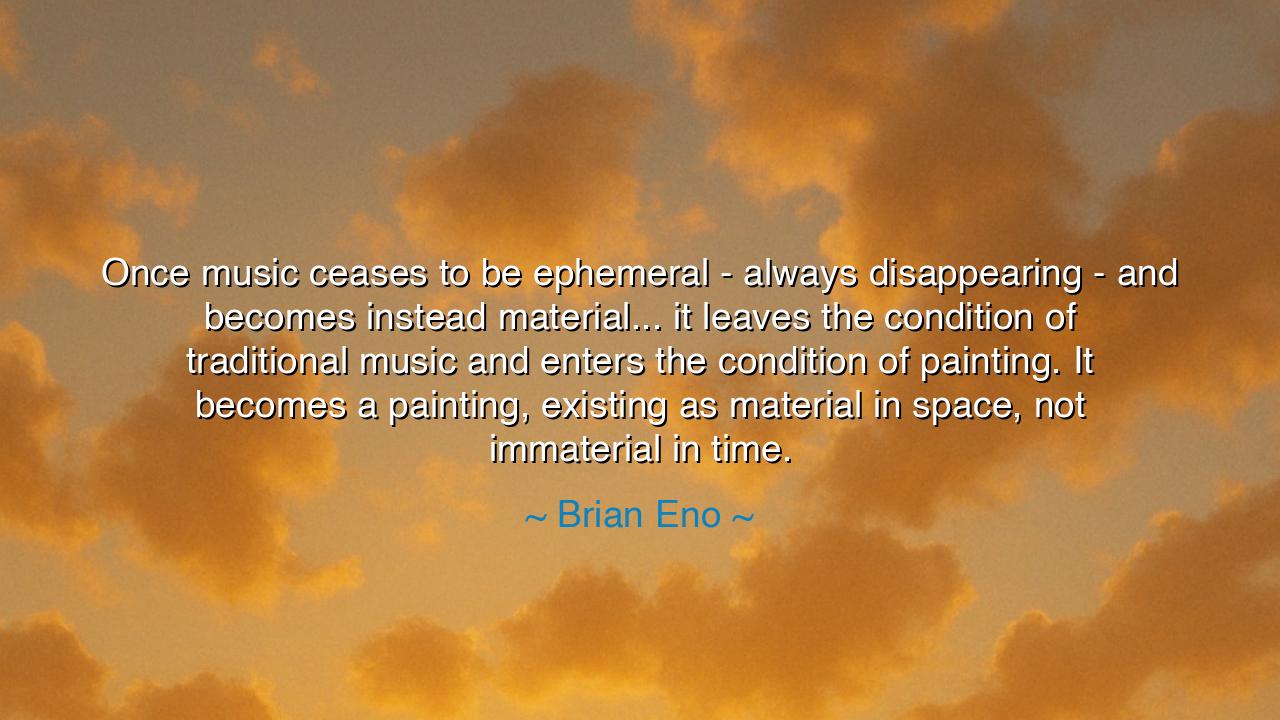
Once music ceases to be ephemeral - always disappearing - and
Once music ceases to be ephemeral - always disappearing - and becomes instead material... it leaves the condition of traditional music and enters the condition of painting. It becomes a painting, existing as material in space, not immaterial in time.






Hear the words of Brian Eno, craftsman of sound and prophet of the ambient, who declared: “Once music ceases to be ephemeral—always disappearing—and becomes instead material... it leaves the condition of traditional music and enters the condition of painting. It becomes a painting, existing as material in space, not immaterial in time.” These words unveil a profound transformation in how we understand music, not merely as sound that flows and fades, but as something that may endure, suspended like a painting upon the wall of existence.
The origin of this thought lies in Eno’s own innovations. In the twentieth century, when recording technology emerged, music could be captured and repeated endlessly. No longer was it bound to the moment of performance, like the fragile notes of a lyre vanishing into night. Now music could be fixed, shaped, and contemplated as one contemplates a canvas. In this transformation, Eno saw that music, which had always belonged to time, now also belonged to space. It could be entered, inhabited, dwelt within, just as one lingers before a painting.
Consider how in ancient times, the power of music was inseparable from its fleetingness. The hymn in the temple, the chant of the poet, the chorus of the theater—these lived only in the breath of performance. When the sound ended, only memory remained. This was its holiness: it was alive, and then it was gone. But once music could be recorded, repeated, and even sculpted electronically, it took on a new life. It became like a mural or a fresco—something that did not die with the passing of the hour, but remained, a structure that could be visited again and again.
This vision is perhaps best seen in Eno’s own ambient music, such as Music for Airports. Here sound is no longer a fleeting melody meant to dazzle or vanish, but a continuous soundscape, a presence in space, like color spread across a canvas. The listener does not wait for its ending, for it is not about beginning or end—it is about dwelling. In this way, music becomes architecture for the spirit, a kind of invisible painting that surrounds us.
Yet Eno’s words are not only about art, but about the transformation of human experience. They remind us that ideas, once thought fleeting, can be given form. Just as music left its ephemeral condition, so too can our thoughts, our words, our moments be given shape that endures. A fleeting kindness, when spoken or recorded, becomes testimony; a fleeting dream, when written, becomes vision. The ephemeral becomes material when we dare to capture it.
History gives us mirrors for this truth. Think of the Lascaux cave paintings, where men of prehistory sought to capture not just the hunt but the spirit of life itself. Their voices, their music, their dances are gone, but the painted bison remain, eternal. So too, recorded music is our age’s cave painting, seizing what was once fleeting and giving it permanence. Where our ancestors used pigment, we use sound etched into grooves, tape, and digital code. Both are attempts to wrestle with time and create permanence from what is passing.
The lesson, therefore, is this: cherish the ephemeral, but also learn to shape it into something enduring. Do not let your moments of inspiration vanish like smoke. Record them, write them, sculpt them, sing them again. Let your creativity, once fleeting, enter the condition of painting, where it may stand as a gift to others and to the future. For though life itself is ephemeral, we can leave marks that endure—marks of sound, color, word, and deed—that will remain when we are gone.
Therefore, O seeker, heed Eno’s wisdom: create not only for the moment, but for eternity. Let your music, your art, your work, your very life become a painting in space, not merely a whisper in time. For those who dare to give form to the fleeting become immortals, their voices echoing even after the breath that first gave them life has ceased.






AAdministratorAdministrator
Welcome, honored guests. Please leave a comment, we will respond soon